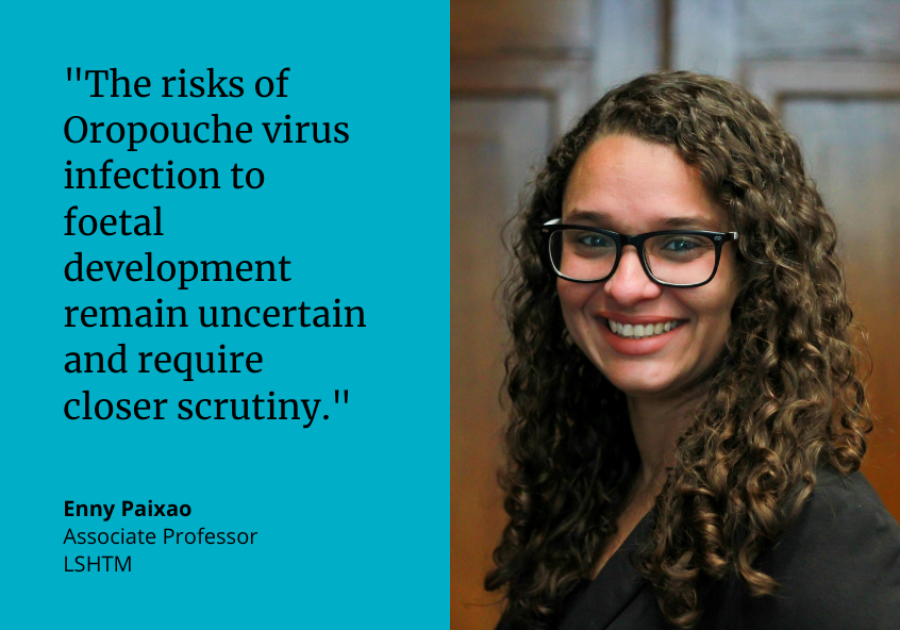Expert Comment – Oropouche outbreak across South America
2 August 2024 London School of Hygiene & Tropical Medicine London School of Hygiene & Tropical Medicine https://lshtm.ac.uk/themes/custom/lshtm/images/lshtm-logo-black.png
"The risks of Oropouche virus infection to foetal development remain uncertain and require closer scrutiny." Enny Paixao, Associate Professor, LSHTM
Two people have died following an outbreak of Oropouche, and authorities are investigating concerns about potential harm to foetuses from the virus.
According to the Pan American Health Organization (PAHO), as of July 16, 2024, there have been 7,688 confirmed cases of Oropouche virus reported across five countries in the Americas: Bolivia, Brazil, Colombia, Cuba, and Peru. Brazil accounts for 90% of these cases.
The two reported deaths are the first to be attributed to Oropouche infection. Brazilian Public health authorities are also investigating whether nine cases of miscarriage, foetal deaths and congenital abnormalities are potentially related to the virus. Oropouche is an arbovirus, spread to people primarily through the bite of infected biting midges. Some mosquitoes have also been known to carry the virus. Other arboviruses include dengue, Zika and chikungunya.
Infected individuals will typically experience a fever illness three to eight days after infection. Common symptoms include a rash; headache; muscle or joint pain with weakness. In some cases, individuals may also experience gastrointestinal symptoms and sensitivity to light. Severe cases are rare but can lead to neurological symptoms, similarly to meningitis or meningoencephalitis.
Patients usually recover well, but muscle pain and weakness has been reported to last for up to one month for some individuals. Estimating the rate of asymptomatic infections is challenging but one study has reported that up to 63% of patients exhibit symptoms.
The Oropouche virus was first isolated in 1955 in Trinidad and has since been found circulating in the Amazonian region, causing sporadic cases and several outbreaks. While most outbreaks have occurred in Brazil, the virus has also been reported in Peru, Panama, and more recently in Ecuador, French Guiana and Colombia.
The pathogenesis of Oropouche infection, how it develops into the disease and severe cases, is poorly understood, and the morbidity and mortality associated with infection may be underestimated.
As of the second half of 2023, reports of infection in both human and non-human hosts suggest the virus is expanding geographically into new areas due to a range of possible factors including climate change.
Associate Professor Enny Paixao from the Centre for Epidemic Preparedness and Response at the London School of Hygiene & Tropical Medicine, said:
“There is much we still do not know about the Oropouche virus but one of the main concerns arising from the current outbreak is its potential harmful effects on unborn foetuses.
“In July 2024, the Pan American Health Organization (PAHO) issued an alert regarding the potential transmission of the Oropouche virus from mother to child in Brazil. Some very limited studies have suggested that antibodies against the virus have been found in children born with microencephaly and that there may be a link between infection, miscarriage, and foetal deaths, but further research is needed to investigate a potential causal link.
“The current outbreak does not yet show the same level of abnormalities in newborns as the Zika epidemic. However, the risks of Oropouche virus infection to foetal development remain uncertain and require closer scrutiny.
“Several factors may explain the recent outbreak, including enhanced surveillance, climate and environmental changes, and potential changes to the virus.
“Similarly to other vector-borne diseases such as dengue, climate change may also be impacting Oropouche virus expansion. Changes to temperature and precipitation can affect transmission, for example, rising temperatures can enhance the rate of development of Culicoides midges, one of the virus’ main transmission vectors alongside mosquitos.
“Previous studies have linked Oropouche outbreaks to increased agricultural activities, highway and road development and bridge construction. These activities disrupt ecosystems by causing population migration, vegetation loss (such as deforestation and illegal mining) and changes in agricultural practices. These changes can alter the distribution of wild animal reservoirs and vectors.
“A recent study also indicates that the main Oropouche virus circulating in 2023-2024 exhibits significantly higher replication in mammalian cells compared to older strains. While it remains unclear if this increased replication leads to greater transmissibility by its vectors, it could help explain the recent rise in cases.
“Surveillance for Oropouche infection is challenging, as there is overlap of symptoms with other co-circulating arboviruses like dengue, Zika and chikungunya. It’s also important to note that the reported figures are based on laboratory-confirmed cases and taking into account that some individuals will not experience symptoms or seek health care, it’s likely that the true number of infections is much higher.
“Therefore, it is plausible that the increased number of cases and enhanced surveillance are bringing rare events, including deaths, to light. The same principle applies to the potential harmful effects on unborn children.
“Although Oropouche virus is not new to Brazil, the factors driving the recent sharp increase—including reported deaths and potential foetal harm—highlight the need for further investigation. Until advancements are made in vaccine development or mosquito and midge control, or until natural immunity within the population increases, the challenge posed by this neglected tropical disease will persist.”
Dr Paixao works closely with partners in Brazil on her research including researchers from the Centro de Integração de Dados e Conhecimento para a Saúde (CIDACS) at the Gonçalo Moniz Institute, Fundação Oswaldo Cruz; and the Collective Health Institute, Federal University of Bahia, Salvador, Bahia, Brazil.
If you enjoyed this article and would like to build a career in global health, we offer a range of MSc programmes covering health and data, infectious and tropical diseases, population health, and public health and policy.
Available on campus or online, including flexible study that works around your work and home life, be part of a global community at the UK's no.1 public health university.